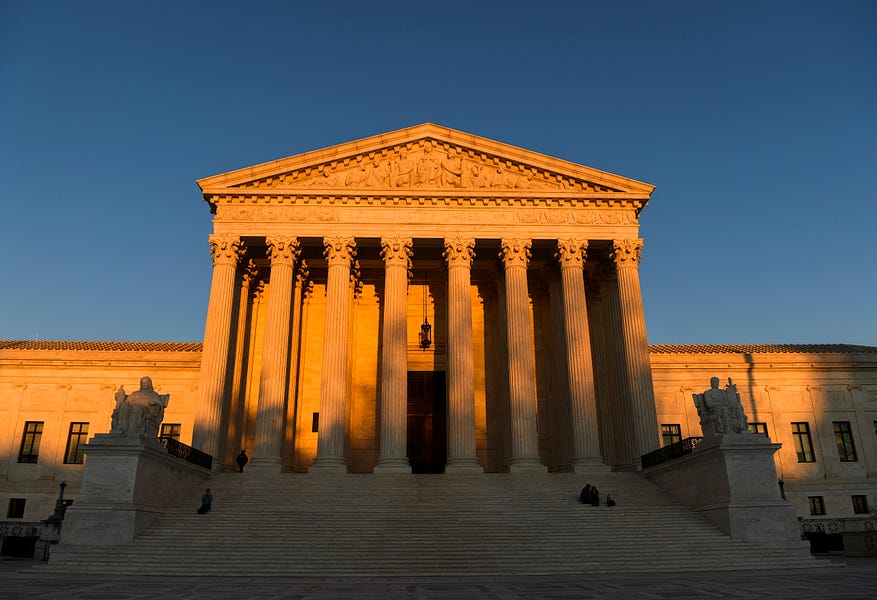For our political culture, the Trump era is ending much as it began—in a hail of delusion and fantasy. Throughout his term, the president has invented stories of his own victimization and heroism, demanded the acceptance of lies as tests of loyalty to himself, and elevated baseless theories from the depths of various internet cesspools. His opponents have often responded in kind, spinning tales of him colluding with Russians in election fraud or scheming to manipulate the postal service.
Our affinity for partisan conspiracy obviously did not begin with this presidency. You can find forms of it throughout our history, especially in times of public cynicism and mistrust. Its current incarnation is at least as old as the internet.
More than two decades ago, Republicans routinely trafficked in wild tales about Bill Clinton’s involvement in assorted drug deals and murder plots. Many Democrats insisted that the 2000 election had been stolen by a carefully choreographed scheme, and some even believed that George W. Bush had foreknowledge of the September 11 attacks or conspired with the Saudis to cover up its origins. A 2004 film by Michael Moore breathlessly purveying these and other lunatic imaginings won the Cannes Film Festival’s highest award and grossed a quarter of a billion dollars. After that year’s elections, the progressive press was full of unsubstantiated tales of fraud and rigged voting machines in Ohio—and two Democrats in Congress even challenged the state’s official results on that basis. In the Obama era, Republicans (including Trump) engaged in baseless and often racially tinged speculations about the president’s birth certificate.
But the fever has clearly grown much hotter in the Trump era. We’ve seen not only the party out of power easing its pain with myths of victimization by shadowy forces but a sitting president actively blurring the line between fantasy and reality. It should be no surprise that he is now concluding his presidency by insisting the election was stolen and beckoning his supporters down a rabbit hole of unreality and grievance. Trump has been our conspiracy monger in chief, and this has brought into sharp relief the illusion at the heart of a certain kind of populist disposition.
To imagine we don’t need responsible elites—or that the desire for institutional integrity is a naïve and over-earnest fantasy—is actually to deny the limits of human reason, power, and ability. It is a kind of utopianism masquerading as realism. It ultimately depends upon the fiction that corrupt elites are exceedingly competent, so that what the people need is their own hyper-competent champion to fight back. In truth, however, neither the elites nor their opponents are particularly capable. They are all human beings, and to imagine that human beings can seamlessly pull off a sophisticated, multilayered, sinister conspiracy over an extended period in a free society is already to lose touch with reality.
The effective tools at our disposal for dealing with reality tend instead to be constructed on the premise of human incompetence and ignorance: They have low expectations of individuals but therefore higher expectations of institutions, which provide us with forms and standards that, among other ways of making us better, can help us sift apart fantasy from truth.
But does it still make any sense to expect such institutions to be functional in a society so deep in the swamp of polarized unreality? Recent years, not to mention recent weeks, have certainly offered some reasons to be skeptical. And yet, the last few weeks have also offered a model of resistance to the wishful conspiracism that has overtaken our politics. One institution in particular has kept its head and helped the country do the same: the federal judiciary.
Judges haven’t always been great at resisting the temptations of the culture war, needless to say. They have frequently been part of the problem with contemporary American politics. But when it comes to contending with conspiracy in particular, the institutional fortitude of the courts has offered some clues to how our broader political culture might do better.
Notably, resistance to the pull of polarized conspiracy has extended to judges nominated by President Trump himself. Faced with claims of election fraud, every judge has demanded evidence, argument, and an adherence to proper procedure, and refused to tolerate groundless fantasy. These judges have done this not as agents or opponents of the president but as professionals—representatives of a set of institutions whose claim to authority is rooted in their commitment to a standard of integrity. It would have been good for us to see all the conspiracies of recent years scrutinized that way.
Getting there wouldn’t mean giving more power to judges. Indeed, the originalist judges who have frustrated President Trump in Pennsylvania, Georgia, the U.S. Supreme Court, and elsewhere would be the first to remind us of that. Rather, it would mean recognizing the importance of professional integrity more broadly, and of institutions with the probity and strength to resist becoming deformed by the pressures of the culture war.
Such rectitude requires work and commitment. The perplexity expressed by some observers on the left that “even Federalist Society judges” have rebuffed the president’s conspiracies has it exactly backward. The Federalist Society is a model of just the kind of institutional formation required to help our country recover its balance. For decades, it has encouraged in its members a firm sense of professional identity, a reverence for the law, and a restrained understanding of the judge’s role. It has formed generations of attorneys not against their profession but for it, and against its corruption by those who would replace the ethic of the lawyer and the judge with political and cultural ambition focused only upon policy outcomes.
That sort of corruption of our professional institutions has grown pervasive. Not only in politics but in journalism, the academy, public health, federal law enforcement, American religious life, and beyond we have lately seen the lure of political expression overcome the strictures of professional formation, and the result has been a cratering of public trust and a growing detachment from reality.
Many journalists and academics who rightly criticize Donald Trump, for instance, should consider whether his behavior relative to what the presidency should be might be eerily similar to their own behavior relative to what journalism or the academy should be: performative culture-war versions of the real thing that render them ridiculous and untrustworthy.
But conservatives who bemoan such corruption should consider what alternatives we offer. Collapsing trust in elites and professionals risks rendering us cynical about institutions that make claims to authority. This is the essence of contemporary populism. But such cynicism poisons the wellsprings of republicanism. It’s part of the problem, not of the solution.
We should criticize elites for failing to live up to professional and institutional standards, not dismiss those standards as a sham. We should demand integrity, not deny it is possible. We should fight for the professions and the universities, not against them. We should want our institutions to be worthy of trust and authority, not seek to burn them down.
The corruption of the American establishment doesn’t mean we can do without elite institutions, it means we need to help them recover their integrity. That calls for long-term cultural transformation of the sort exemplified by the Federalist Society and too often resisted and resented by both radicals and populists in our politics.
Conservatives know that people start out fallen and morally stooped, but we should also know that people can be formed into a more upright posture. The institutions that enable such formation are what we struggle to conserve in every generation. We must not deny the possibility, or ignore the many instances, of their effectiveness. We should recognize that elites are unavoidable, but can be made more bearable by being moored to institutions that restrain them and direct them toward responsibility.
And we must recognize that it is not only elites who require such formation. We all need it. And we all get it only from functional, often traditional, social institutions. The orgy of cynical self-indulgence that has overwhelmed our politics from all directions in recent years is evidence of that, not proof against it. The core claims of our populists themselves depend upon the possibility of a responsible citizenry, which should lead us to reflect on what it takes to make such people.
The judges who have insisted on standards of evidence and argument in the midst of our post-election mayhem offer a model of what institutional commitment and professional formation can do for our society. They should help us see the value of a responsible elite, to feel more keenly its absence in much of American life, and so to better understand the nature and the depth of the challenge that confronts our country.
Yuval Levin is director of social, cultural, and constitutional studies at the American Enterprise Institute and editor of National Affairs.





Please note that we at The Dispatch hold ourselves, our work, and our commenters to a higher standard than other places on the internet. We welcome comments that foster genuine debate or discussion—including comments critical of us or our work—but responses that include ad hominem attacks on fellow Dispatch members or are intended to stoke fear and anger may be moderated.
With your membership, you only have the ability to comment on The Morning Dispatch articles. Consider upgrading to join the conversation everywhere.